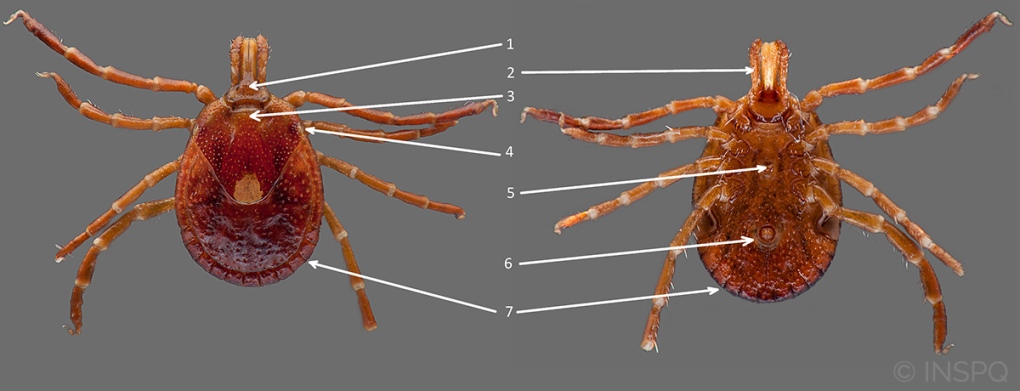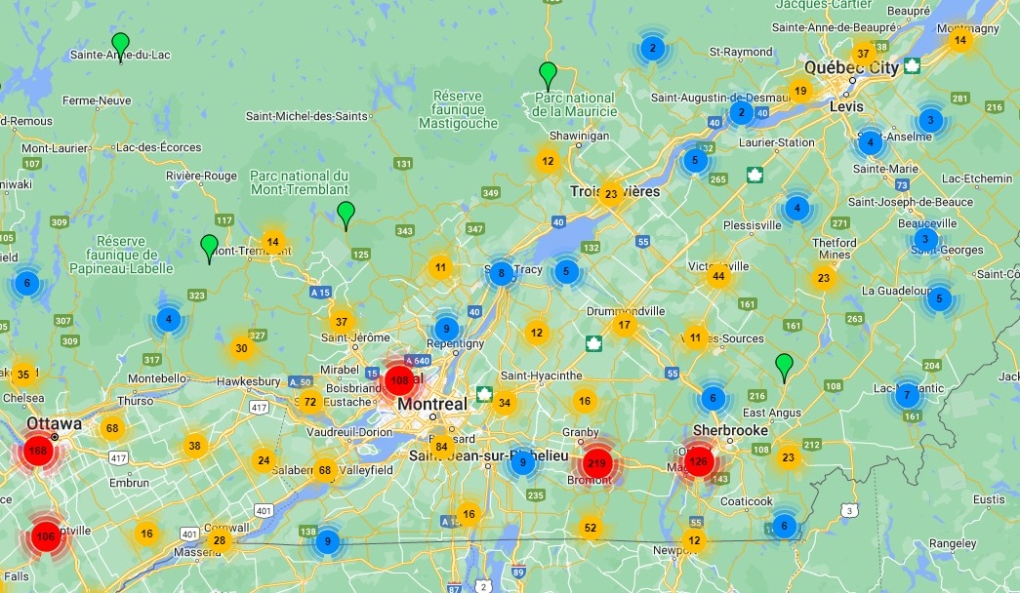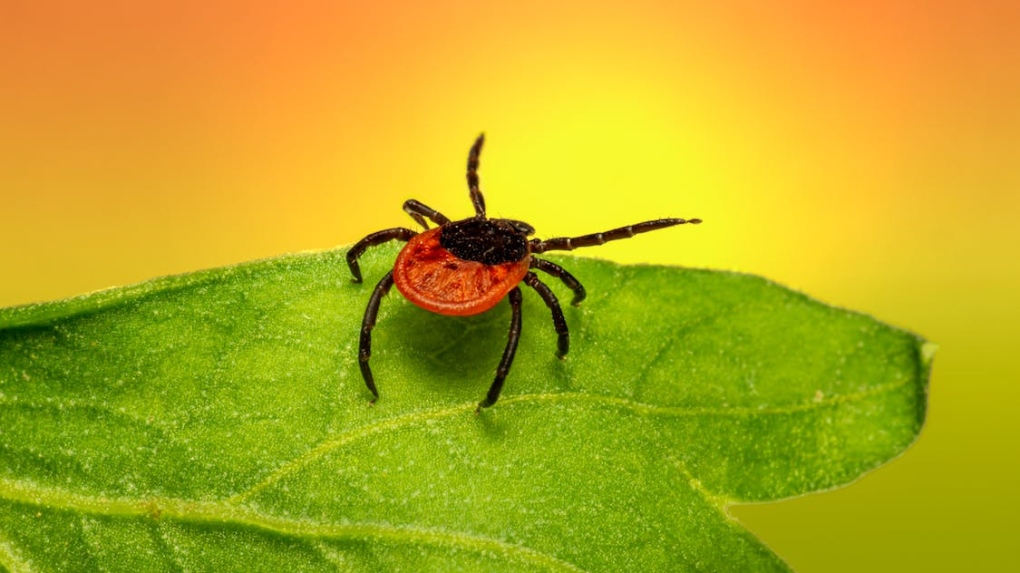An 'aggressive biter': There's a new tick to worry about in Quebec and Ontario
As the snow melts, grass grows, and the sun comes out, Montrealers in short pants are not the only species to emerge in the parks and trails of the region.
It is also tick time.
In Quebec, there are about a dozen species of tick of the around 40 in Canada. Of those, around four interact with humans, the most concerning being the blacklegged (deer) tick (Ixodes scapularis) that can carry Lyme disease (Borrelia burgdorferi bacteria).
"Ticks, and the blacklegged tick that everyone is talking about, do very much like humidity, cool weather, so as soon as there's no more snow cover on the ground, they will begin their activity," said Bishop's University professor Jade Savage, who runs the website eTick, which monitors tick activity across the country.
A new species that public health authorities are monitoring with concern is the lone star tick (Amblyomma americanum), which has been spotted but is not yet established north of the U.S. border.
Climate change and habitat loss are making it almost inevitable that the arthropods that typically live in the southeastern United States and Mexico will show up more often in Canada.
"Everybody knows that the lone star tick is slowly moving northward, a little like what we saw with the blacklegged tick almost 30 years ago," said Savage. "The lone star tick is expected by many to be the next step primarily because we're getting warmer winters."
 The lone star tick has been spotted in Quebec and the public health bodies in the province are urging residents wo watch for them. SOURCE: INSPQ
The lone star tick has been spotted in Quebec and the public health bodies in the province are urging residents wo watch for them. SOURCE: INSPQ
The ticks' presence is a concern because with the new species comes new pathogens, Savage said, and the lone star tick, in particular, is "an aggressive biter."
"It is definitely not something anybody wants to see established in Canada, but the probability of this happening are relatively high," she said.
Lone star ticks were reported in Ontario twice in 2023, and around two dozen times in 2022. The species has been reported five times in Quebec since 2017.
 A map of spots where ticks were reported in southwestern Quebec. SOURCE: Etick
A map of spots where ticks were reported in southwestern Quebec. SOURCE: Etick
If you see a tick, the best advice is to take a picture of it and submit it on the eTick site. Someone from the site will contact you and advise you of what action, if any, to take.
Quebec public health advises the following to avoid tick bites:
- Wear long clothing.
- Use a DEET or icaridin-based mosquito repellent.
- Walk along trails.
- Maintain yards and cut long grass, especially in areas children play in.
Savage said the best strategy to limit the risks of contracting Lyme disease is to check for ticks when you get home.
"If any ticks are found, it can be removed swiftly and if a black-legged tick less than 24 hours after it was attached, the probability of contracting the disease is much lower," said Savage. "Prevention is the ideal strategy."
 The blacklegged (deer) tick is a major carrier of Lyme disease, and cases of the disease are increasing in Quebec. SOURCE: Pexels
The blacklegged (deer) tick is a major carrier of Lyme disease, and cases of the disease are increasing in Quebec. SOURCE: Pexels
Montreal public health issued a prescription for pharmacists to offer post-exposure prophylaxis (PEP) to anyone bitten by a tick that may have contracted Lyme disease.
Cases of Lyme disease continue to rise. Quebec reported 125 cases in 2014, 304 in 2018 and 709 in 2021.
The expanding deer population in Quebec also means more ticks and more Lyme disease. Though ticks travel on many animals, Savage said the size and range of deer make them ideal ways for the insects to travel.
"Deer are literally like tick buses," said Savage. "They are a very suitable habitat for the ticks and because they travel long distances, they definitely contribute to the distribution of ticks from different types of habitats, and as the deer get closer to urban habitats, they will bring the blacklegged ticks with them.
CTVNews.ca Top Stories

Trudeau's 2024: Did the PM become less popular this year?
Justin Trudeau’s numbers have been relatively steady this calendar year, but they've also been at their worst, according to tracking data from CTV News pollster Nik Nanos.
Manhunt underway after woman, 23, allegedly kidnapped, found alive in river
A woman in her 20s who was possibly abducted by her ex is in hospital after the car she was in plunged into the Richelieu River.
Calling all bloodhounds: These P.E.I. blood donors have four legs and a tail
Dogs are donating blood and saving the lives of canines at the University of Prince Edward Island's Atlantic Veterinary College in Charlottetown.
Summer McIntosh makes guest appearance in 'The Nutcracker'
Summer McIntosh made a splash during her guest appearance in The National Ballet of Canada’s production of 'The Nutcracker.'
Death toll in attack on Christmas market in Germany rises to 5 and more than 200 injured
Germans on Saturday mourned both the victims and their shaken sense of security after a Saudi doctor intentionally drove into a Christmas market teeming with holiday shoppers, killing at least five people, including a small child, and wounding at least 200 others.
Wild boar hybrid identified near Fort Macleod, Alta.
Acting on information, an investigation by the Municipal District of Willow Creek's Agricultural Services Board (ASB) found a small population of wild boar hybrids being farmed near Fort Macleod.
Toronto firefighters rescue man who fell into sinkhole in Yorkville
A man who fell into a sinkhole in Yorkville on a snowy Friday night in Toronto has been rescued after being stuck in the ground for roughly half an hour.
Winning $20-million Lotto Max ticket sold in Hamilton
Someone who purchased a Lotto Max ticket in Hamilton for Friday night’s draw is now $20-million richer.
Overheated immigration system needed 'discipline' infusion: minister
An 'overheated' immigration system that admitted record numbers of newcomers to the country has harmed Canada's decades-old consensus on the benefits of immigration, Immigration Minister Marc Miller said, as he reflected on the changes in his department in a year-end interview.































